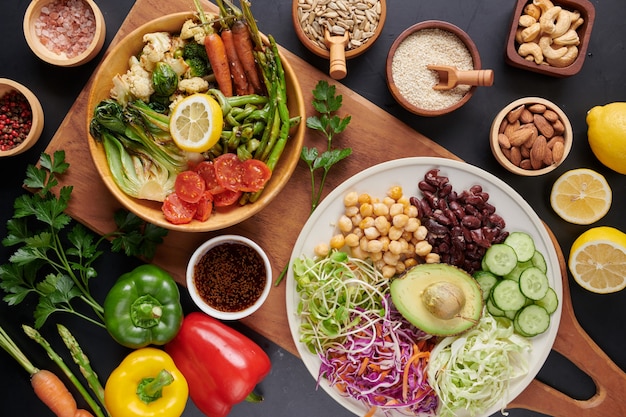Nutrition Strategies for Coping with Cancer and Treatment

Embarking on the challenging journey of cancer treatment requires a holistic approach, and one crucial aspect that often takes center stage is nutrition. The delicate balance between nourishing the body and coping with the side effects of treatment becomes a pivotal element in the overall well-being of cancer patients. In this exploration, we delve into the nutritional balancing act, offering insights and strategies to empower individuals facing the dual challenge of cancer and its treatment.
Understanding the Nutritional Landscape:
Cancer and its treatments can impact the body in multifaceted ways, influencing appetite, digestion, and nutrient absorption. It’s essential to recognize that each individual’s experience is unique, and a personalized approach to nutrition can make a significant difference.
1. Adequate Caloric Intake:
Maintaining a healthy weight is crucial for overall well-being, and cancer treatment can sometimes lead to weight loss. Ensuring an adequate caloric intake becomes paramount. Calorie-dense, nutrient-rich foods can be incorporated to meet energy needs.
2. Prioritizing Protein:
Protein is the building block for tissue repair and immune function. Cancer patients may have increased protein needs, especially during recovery from surgery or when undergoing treatments that impact muscle mass. Lean proteins such as poultry, fish, tofu, and legumes can be valuable additions.
3. Hydration Matters:
Staying hydrated is vital, but cancer treatments such as chemotherapy can sometimes cause nausea or changes in taste that affect fluid intake. Sipping water throughout the day, trying flavored water, or incorporating hydrating foods like watermelon or cucumber can contribute to proper hydration.
4. Managing Digestive Challenges:
Some cancer treatments may result in digestive issues such as nausea, vomiting, or changes in bowel habits. Opting for smaller, more frequent meals, and choosing easily digestible foods can help manage these challenges. Ginger and peppermint, known for their digestive benefits, may also be considered.
5. Addressing Taste Changes:
Changes in taste perception are common during cancer treatment. Experimenting with different seasonings, and marinades, and incorporating citrus or herbs can enhance the flavor of foods. Trying cold or room-temperature foods might be more appealing for individuals experiencing taste changes.
6. Nutrient-Rich Choices:
Prioritizing nutrient-dense foods becomes crucial to provide the body with essential vitamins and minerals. Incorporating a variety of colorful fruits, vegetables, whole grains, and healthy fats ensures a broad spectrum of nutrients.
7. Seeking Professional Guidance:
Consulting with a registered dietitian or nutritionist specializing in oncology can provide personalized guidance. These professionals can tailor nutritional recommendations based on the individual’s specific diagnosis, treatment plan, and unique nutritional needs.
8. Building a Support System:
Nutrition is not only about what’s on the plate but also about the emotional and social aspects of eating. Building a supportive network and seeking guidance from healthcare professionals, support groups, or counselors can contribute to a holistic approach to well-being.
9. Coping with Loss of Appetite:
Cancer treatments, such as chemotherapy, can often lead to a temporary loss of appetite. In such cases, focusing on small, nutrient-dense meals and snacks can help meet nutritional needs. Experimenting with different textures and flavors may also spark interest in food.
10. Supplementing Wisely:
In some cases, cancer treatments may impact the absorption of certain nutrients, leading to deficiencies. Working with healthcare professionals to identify potential deficiencies and incorporating appropriate supplements can be an essential aspect of nutritional care.
11. Embracing Mindful Eating:
Mindful eating involves being present and fully engaged in the act of eating. Cancer patients can benefit from this approach by savoring each bite, paying attention to hunger and fullness cues, and cultivating a positive and mindful relationship with food.
12. Gentle Exercise for Well-Being:
Integrating gentle exercise into the routine can complement nutritional strategies. Activities like walking, yoga, or tai chi not only contribute to physical well-being but also aid in managing stress, promoting appetite, and enhancing overall quality of life.
13. Managing Treatment-Related Weight Changes:
Cancer treatments may lead to weight gain or loss. For those experiencing unintentional weight loss, incorporating calorie-dense snacks, protein-rich smoothies, and healthy fats becomes essential. For individuals dealing with weight gain, adopting a balanced and portion-controlled diet can be beneficial.
14. Emotional Eating Awareness:
Emotional factors can significantly impact eating habits, especially during cancer treatment. Being aware of emotional triggers and finding alternative coping mechanisms, such as journaling, counseling, or engaging in activities that bring joy, can help maintain a healthy relationship with food.
15. Celebrating Food Varieties:
The journey of nutritional care during cancer treatment is not about restriction but celebration. Embracing a variety of foods ensures a spectrum of nutrients and culinary enjoyment. Experimenting with global cuisines, trying new recipes, and exploring diverse food options can add vibrancy to the dining experience.
16. Post-Treatment Nutrition:
As individuals transition into the post-treatment phase, focusing on recovery and rebuilding becomes crucial. Gradually reintroducing a broader range of foods, adapting to changing nutritional needs, and continuing to prioritize overall well-being are essential considerations.
17. Integrating Family and Caregivers:
Nutrition is a collective effort that extends beyond the individual. Involving family members and caregivers in meal preparation, planning, and creating a supportive environment can enhance the overall nutritional experience for cancer patients.
Conclusion: A Personalized Path to Wellness
Navigating the nutritional balancing act during cancer treatment requires adaptability, resilience, and personalized strategies. By recognizing the unique needs and challenges of each individual, a holistic approach to nutrition becomes an integral part of the journey toward healing and well-being. The goal is not just to nourish the body but to empower individuals facing cancer with the tools and strategies to navigate their path to wellness. In this balancing act, nutrition becomes a source of strength, resilience, and hope.
Also read: The Gym: A Holistic Approach to Health and Fitness








